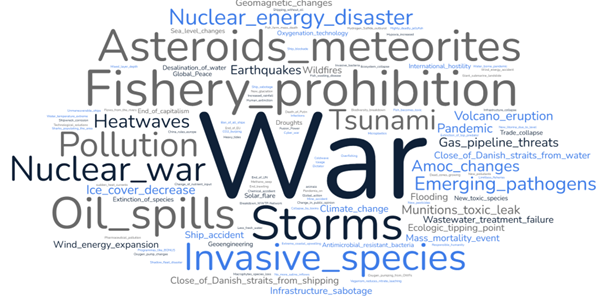Multiple drivers of Earth system changes in the Baltic Sea region
This Grand Challenge is currently under revision.
The scope and possible outcomes in the next phase of Baltic Earth are currently under discussion.
Learn more about the progress below under News and Events.
Overarching research question(s)
The overall aim of the group is to increase our understanding on the multiple interactions between the human and natural systems that drive pollution, overuse and degradation of aquatic environments, with a specific focus on Baltic Sea and its catchment area. Building on the group’s earlier projects and contributions (Reckermann et al. 2022) we take a future oriented view, and focus on two research questions.
How capable are current modeling tools in delivering research insights that enable society to mitigate risks and adapt to low-probability, high-impact events, often referred to as "wild card" events?
What is the readiness of Baltic Sea for developing Digital Twin Ocean applications, and their potential added value for ecosystem management?
Background and objectives
The Industrial Revolution, along with subsequent technological advancements, economic growth, urbanization, and globalization, has dramatically transformed the world. These developments have brought immense benefits to humanity but have also led to harmful and detrimental impacts on ecosystems. Despite numerous national and international policies and legislation aimed at controlling pollution, overfishing, and biodiversity loss, many aquatic and terrestrial ecosystems remain in poor condition. Identifying effective management strategies is still hindered by our incomplete understanding of the complex interactions between different drivers and impacts.
The group aims to introduce holistic systems thinking to support more reliable forecasting and better-informed decision-making. The group concentrates on drivers, interactions, and historical developments that contribute to the current environmental challenges in the Baltic Sea region. It addresses key knowledge gaps that limit effective environmental management. The work contributes to the further development of coupled models that are used to predict how marine, terrestrial, and atmospheric systems may respond to future trends, hazards, or policy interventions.
Activities
The group organizes meetings and workshops to foster collaborative research and spark innovative ideas. Currently, the group focuses on two key topics.
Study 1: Do we have the tools to tackle future environmental hazards in marine and coastal environments? Research and writing processes moderated by Kari Hyytiäinen, Jamie Jenkins, Vilma Sandström, and Susa Niiranen, scheduled 2025
Study 2: What is the potential of the Digital Twin Ocean concept for Baltic Earth? Research and writing processes moderated by Susa Niiranen, Kari Hyytiäinen et al., scheduled to start: autumn 2025/early 2026
Process description: Wild cards in the Baltic Sea – are we ready for the unexpected?
“We invite interested experts to contribute to ongoing research exploring how existing modelling tools can help assess and mitigate the impacts of wild card events in the Baltic Sea region. These are unpredictable, low-probability but high-impact events that can disrupt ecosystems, societies, or economies.
This work is part of the “Multiple Drivers for Regional Earth System Changes” working group within the Baltic Earth research network. It builds on a workshop held in Helsinki (December 2024) and initial data collection during the Baltic Sea Science Meeting in Sopot (May 2025).
We are particularly looking for specialists experienced in modelling within the Baltic Sea context. A PDF attachment (link) provides more details about the research focus, process, and a summary of wild card events identified during the Baltic Sea Science Congress.
Upcoming steps in the project:
|
 |
Participation is flexible: you can join for one or multiple steps. Those who take part throughout the entire process will be credited as co-authors on the paper.
If you’re interested in joining or would like to learn more, please get in touch with Jamie Jenkins: jamie.jenkins@helsinki.fi”
Description of tasks (or Terms of Reference)
Potential activities include the organization of conferences and workshops to bring different disciplines together and do syntheses, agree on datasets and data gaps, scope out the system to model with its key components and their interactions, and design model experiments. The development of coupled Earth system models capturing interactions between atmospheric, marine and land compartments/processes, as well as responses to anthropogenic forcing such as emissions and land use is a key long-term goal.
News and Events
Meeting of the Baltic Earth Working Group
Multiple drivers for Earth system changes
27th May 2025, Sopot, Poland
The Baltic Earth Working Group on Multiple Drivers of Earth System Changes focuses on complex drivers, interactions, and historical factors that have contributed to current environmental challenges in the Baltic Sea region.
This meeting will be organized as part of the Baltic Sea Science Conference 2025. We are pleased to invite interested participants of the conference to join in working group meeting. The aims of the meeting are to discuss current plans and brainstorm new ideas for joint activities.
2nd Baltic Earth Workshop on "Multiple Drivers in Earth system changes in the Baltic Sea region"
4-5 December, 2024, Helsinki, Finland
After the completion of the first phase of Baltic Earth and with the onset of a new phase, we are now revisiting the Baltic Earth Working Group on “Multiple drivers for Earth system changes in the Baltic Sea”. This international Workshop shall set the scope for the new phase of this updated Baltic Earth Research Topic (RT) and bring together scientists and managers who are interested in collaborating in this continued Baltic Earth activity.
Baltic Earth Workshop on
Multiple drivers for Earth system changes in the Baltic Sea region
Tallinn University of Technology, Tallinn, Estonia, 26- 27 November 2018
Co-organized by Helmholtz-Zentrum Hereon, Leibniz Institute for Baltic Sea Research and Tallinn University of Technology in collaboration with with BONUS, HELCOM and ICES
Baltic Earth session at EGU General Assembly 2019
Climate and other drivers of change: Interlinkages, ramifications and impacts in coastal regions
Vienna, Austria, 7-12 April 2019
Outcomes (Data, reports, publications, events)
Main outcome of this WG is the Baltic Earth Assessment Report in Earth System Dynamics:
WG members
See author list of the BEAR paper on Human impacts (above)

